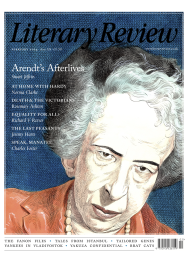Megan Vaughan
Postcolonial Pains
The Rebel’s Clinic: The Revolutionary Lives of Frantz Fanon
By Adam Shatz
Apollo 464pp £25
Posters went up in my part of London a few weeks ago advertising a talk on Frantz Fanon and decolonisation. As the war rages in Israel and Gaza, Fanon is once again invoked, as he has been many times since his death in 1961, for his insights into the plight of the colonised and the role of revolutionary violence. In this wonderful new biography, Adam Shatz argues for the inseparability of Fanon’s political, literary and psychiatric activities, while also exploring the many afterlives of his thinking and writing.
Frantz Omar Fanon (1925-61) was one of the 20th century’s most influential anti-colonial and anti-racist thinkers. Soldier, revolutionary, psychiatrist and philosopher, he addressed in his work the lasting disfiguring effects of racial oppression and was widely read across liberation movements in the 1960s and 1970s. He is known to many for his support for violence in The Wretched of the Earth, but Shatz makes a powerful case for a more complex reading.
What accounts for Fanon’s lasting appeal? First, and most obviously, the injustices he railed against – colonialism and racial and class oppression – are still very much with us. Second (and perhaps disappointingly for those looking for easy answers), Fanon keeps you coming back to him because nothing is ever

Sign Up to our newsletter
Receive free articles, highlights from the archive, news, details of prizes, and much more.@Lit_Review
Follow Literary Review on Twitter
Twitter Feed
It wasn’t until 1825 that Pepys’s diary became available for the first time. How it was eventually decrypted and published is a story of subterfuge and duplicity.
Kate Loveman tells the tale.
Kate Loveman - Publishing Pepys
Kate Loveman: Publishing Pepys
literaryreview.co.uk
Arthur Christopher Benson was a pillar of the Edwardian establishment. He was supremely well connected. As his newly published diaries reveal, he was also riotously indiscreet.
Piers Brendon compares Benson’s journals to others from the 20th century.
Piers Brendon - Land of Dopes & Tories
Piers Brendon: Land of Dopes & Tories - The Benson Diaries: Selections from the Diary of Arthur Christopher Benson by Eamon Duffy & Ronald Hyam (edd)
literaryreview.co.uk
Of the siblings Gwen and Augustus John, it is Augustus who has commanded most attention from collectors and connoisseurs.
Was he really the finer artist, asks Tanya Harrod, or is it time Gwen emerged from her brother’s shadow?
Tanya Harrod - Cut from the Same Canvas
Tanya Harrod: Cut from the Same Canvas - Artists, Siblings, Visionaries: The Lives and Loves of Gwen and Augustus John by Judith Mackrell
literaryreview.co.uk